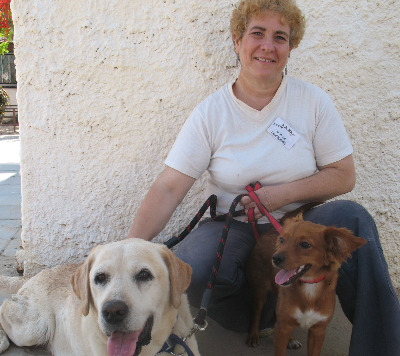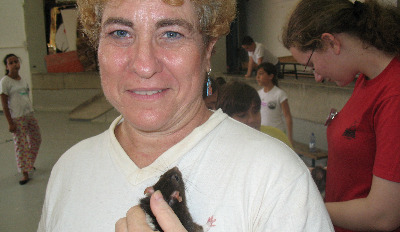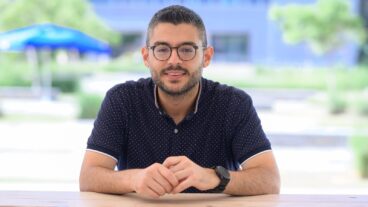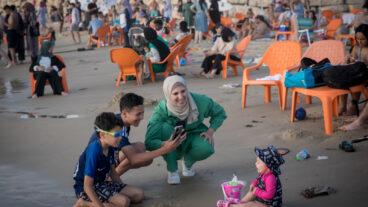Convinced that compassion for animals will positively impact society, Khaya Dinsky tirelessly volunteers for their cause, giving a helping hand in times of trauma.

As dozens of rockets hit the Israeli coastal city of Ashkelon during the Gaza war from late December 2008 to mid-January 2009, it wasn’t only people who were traumatized, it was also their pets. Many of those seeking help for their traumatized animals reached out to Khaya Dinsky.
The 54-year-old special-education teacher and animal therapist has earned a reputation over her 35 years in Israel as a person to turn to when animals are in crisis.
Soon after emigrating from Brooklyn, New York, at age 18, she began to rescue stray dogs and cats, keeping some and finding homes for others. The self-imposed project was a constant throughout years of schooling, marriage, divorce, teaching and single motherhood.
“But I reached the point where I physically couldn’t care for more rescued animals myself,” she tells ISRAEL21c. “I’m a teacher and not a millionaire. I realized I needed to have an amuta [Hebrew for non-profit organization].”
Hatzalat Hayot (Animal Rescue) was registered in June 2009 with a board of directors comprised of three English speakers and three Russian speakers from Ashkelon. It depends heavily on a corps of local volunteers.
Kudos received, funds still needed
The group had already been functioning unofficially for six months when the rockets began falling. “During the war, we were in touch with organizations all over the country to line up foster homes if someone needed to get out of their house and had nowhere for their pets,” Dinsky recounts.
She sent out Internet postings offering temporary shelter for classroom animals. She let people know of a local kennel taking animals for a week without charge. She advised the owners of traumatized pets, and convinced a reporter to publicize the plight of horses and donkeys left without food or water at a local stable.
In the fall of that year, Dinsky accepted an award on behalf of Hatzalat Hayot from Ashkelon’s mayor, who annually recognizes the city’s non-profits and outstanding volunteers.
It’s nice to have the kudos, but Dinsky also needs dollars. Last year, Israeli actress Orna Banai agreed to lend her star power to a Hatzalat Hayot fund-raiser. Money is always tight as rescued and fostered animals need food as well as veterinary care for a variety of injuries and illnesses.
A dynamo for animal welfare
The volunteer work fills Dinsky’s time away from school. “There are days we get a zillion calls because someone’s cats were poisoned and somebody can’t feed their dog, and somebody found a stray dog and a sick cat and everybody needs advice. Between writing a column for the local paper on animal care, organizing adoption days and answering calls and e-mails, the absolute minimum time I spend on this project is two hours a day.”

Her group enjoys a cooperative relationship with many of Israel’s other animal welfare organizations, particularly those based in larger cities. Hatzalat Hayot stands out for serving a particularly large region and for its emphasis on community outreach.
Each month, Dinsky arranges animal welfare classes at the local immigrant absorption center and she’s working with Ashkelon’s staff veterinarian to write a curriculum on responsible pet ownership to present in all public schools.
Despite her full-time job, she’s often nursing abandoned kittens or rushing out to aid animals in distress. Recently, she and a volunteer went out at 11:30pm to coax a stray dog out of a traffic circle. It took two hours to get him on a leash and into the volunteer’s home.
Counting on the ripple effect
Dinsky houses four dogs, 11 cats and four foster kittens in her own apartment. “We are considering opening a shelter because we serve a tremendous area and don’t have enough foster families or volunteers,” she relates.
She has a cadre of professional dog trainers who donate their services to rescued animals and to anyone seeking help with a particularly difficult pet. Her aim is to make rescued dogs adoptable and keep difficult dogs who have homes from ending up in the city pound. She also recruits teens to help housebound pet owners with animal care.
And there’s more. Dinsky is involved with various projects of the social justice organization Yedid for workers and immigrants, indigent soldiers and high school children in single-parent households.
“What keeps me going?” she muses, “Over the years I have had various personal difficulties and the community has been amazingly helpful. I can never repay the people who have helped me, but I can give time, energy and effort to the society at large. If people don’t have compassion for animals it rubs off on the greater society, while if they’re compassionate to animals it also rubs off in a positive way. I see that clearly with the kids I work with.”
She recalls an incident at school where two troublemakers began to fight, but when she reminded them that they had left the classroom rabbits unattended, they hurriedly made a truce and rushed back to tend to the creatures. This is the sort of effect Dinsky hopes to achieve in larger and larger circles.













